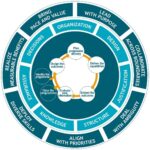[Updated April 2021 – MSP® 5th Edition]
- Two-day fully-accredited course
Managing Successful Programmes (MSP®) represents proven good practice in the successful adoption of enterprise agility through the application of programme management. It is a framework whereby large, complex change can be broken down into manageable, inter-related projects.
MSP has been used and adopted by many organisations both within the public and private sectors.
Why adopt MSP?
Today’s organisations exist in a climate of constant and increasing change. Organisations that have learned how to transform themselves through effective leadership and strategic control are more likely to survive and prosper. Programme management is increasingly being recognised as key to enabling organisations to manage that transformation.
Where there is major change there will be complexity, risk, many interdependencies to manage, and conflicting priorities to resolve. Experience shows that organisations are likely to fail to deliver change successfully where:
- There is insufficient board-level support
- Leadership is weak
- There are unrealistic expectations of the organisational capacity and capability to change
- There is insufficient focus on benefits
- There is no real picture of the future capability
- There is a poorly defined or poorly communicated vision
- The organisation fails to change culture
- There is insufficient engagement of stakeholders.
Adopting a programme management approach such as MSP provides a structured framework that can help organisations avoid these pitfalls and achieve their goals.
Roles and responsibilities
MSP defines the roles and responsibilities of all who need to form part of the leadership of a programme. Effective leadership of a programme is achieved through informed decision-making and a flexible management regime. The key roles involved are:
- Sponsoring Group
- Senior Responsible Owner
- Programme Manager
- Business Change Manager
- Programme Office.
MSP Integrated Framework
There are three lenses to the MSP framework:
Principles – the common factors that underpin the success of any programme.
Themes – covering essential governance and controls.
Processes – an incremental lifecycle that is flexible and adaptable yet enables an orderly progression with clear decision criteria

Copyright Axelos Limited
This course is available as a 5-day combined Foundation & Practitioner module, also available as a 3-day Foundation module or 2-day Practitioner module where the 5th Edition Foundation exam has been achieved previously.
 Project Management
Project Management 



